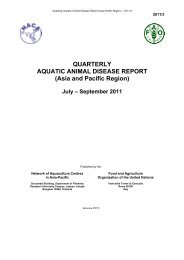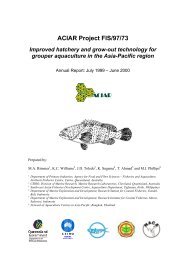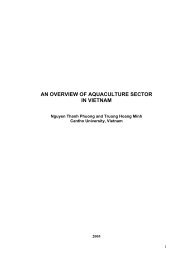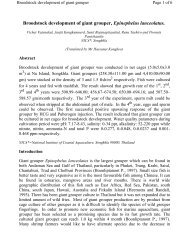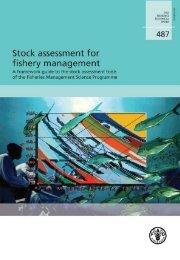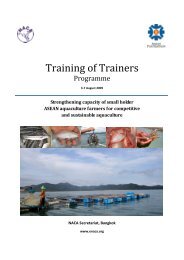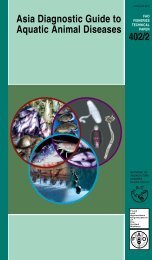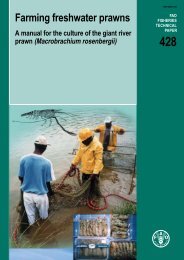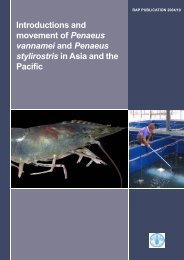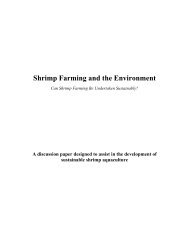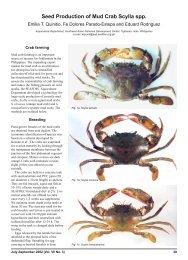State of World Fisheries and Aquaculture 2004 - Library
State of World Fisheries and Aquaculture 2004 - Library
State of World Fisheries and Aquaculture 2004 - Library
Create successful ePaper yourself
Turn your PDF publications into a flip-book with our unique Google optimized e-Paper software.
8<br />
The <strong>State</strong> <strong>of</strong> <strong>World</strong> <strong>Fisheries</strong> <strong>and</strong> <strong>Aquaculture</strong> <strong>2004</strong><br />
The Northwest <strong>and</strong> Southeast Pacific are still the most productive marine<br />
fishing areas (Figure 5), although total catches in these two areas decreased by 1.8<br />
<strong>and</strong> 2.0 million tonnes in 2002 compared with 2000 levels. Catches also decreased<br />
substantially from 2000 levels in the Eastern Central <strong>and</strong> Southwest Atlantic. In the<br />
former area, catches had increased in 2001 but decreased by more than 0.5 million<br />
tonnes in 2002, largely as a result <strong>of</strong> reduced small pelagic <strong>and</strong> cephalopod catches.<br />
In the Southwest Atlantic, cephalopod catches have declined even more dramatically,<br />
from 1.2 million tonnes in 1999 to 0.54 million tonnes in 2002. By contrast, catches<br />
were still growing in fishing areas that mostly lie in the tropical regions <strong>of</strong> the<br />
Indian <strong>and</strong> Pacific Oceans, where catches <strong>of</strong> large (mainly tuna) <strong>and</strong> small pelagic<br />
species continued to increase. Among the main fishing areas in temperate waters,<br />
total catches in the Northeast Atlantic <strong>and</strong> Mediterranean did not show significant<br />
variations, while in the Northwest Atlantic <strong>and</strong> in the Northeast Pacific, total catches<br />
increased in 2001 <strong>and</strong> remained stable in 2002.<br />
After the high catches <strong>of</strong> 2000 (the third highest ever at 11.3 million tonnes),<br />
anchoveta decreased to 7.2 million tonnes in 2001 <strong>and</strong> recovered to 9.7 million tonnes<br />
<br />
<br />
<br />
<br />
<br />
<br />
<br />
<br />
<br />
<br />
<br />
<br />
<br />
<br />
<br />
<br />
<br />
<br />
<br />
<br />
<br />
<br />
<br />
<br />
<br />
<br />
<br />
<br />
<br />
<br />
<br />
<br />
<br />
<br />
<br />
<br />
<br />
<br />
<br />
<br />
<br />
<br />
<br />
<br />
<br />
<br />
<br />
<br />
<br />
<br />
Note:



